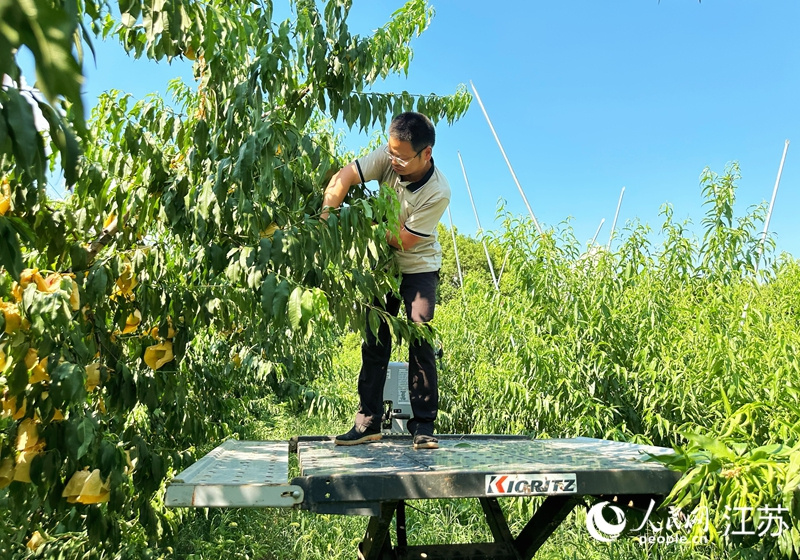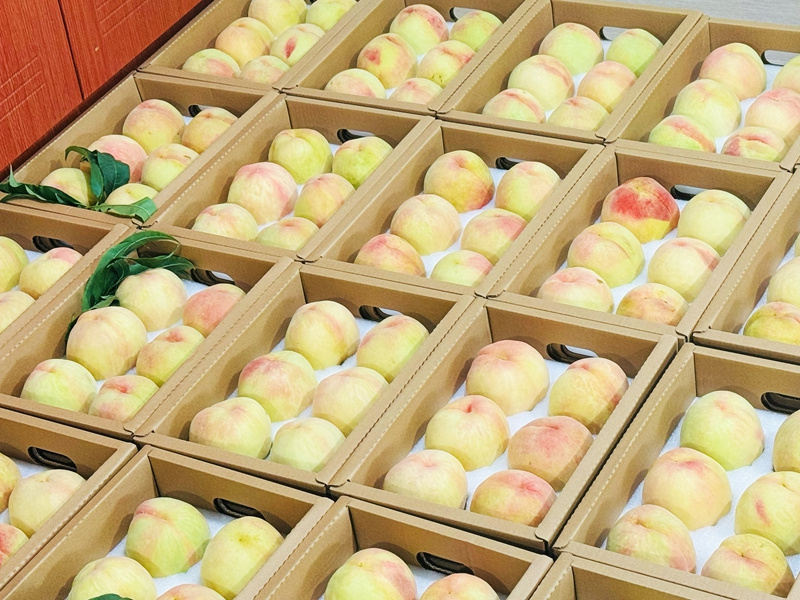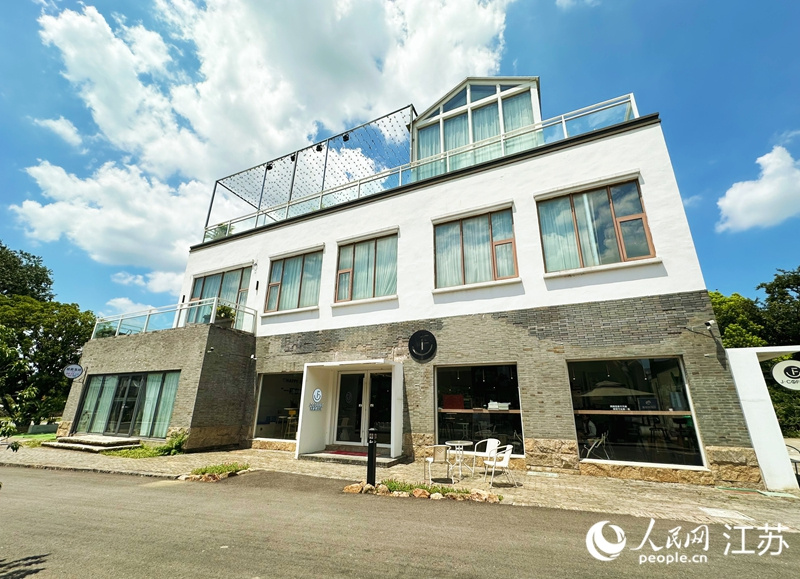Peach industry thrives in small township in China's Jiangsu
"A box of Yangshan honey peaches can be sold for between tens of yuan (one yuan equals about $0.14) to hundreds of yuan. This year, I sold 30,000 boxes of such peaches," said Sun Jianqin, owner of a family farm in Yangshan township, Huishan district, Wuxi city, east China's Jiangsu Province.
Sun also sells peach juice and runs a bed-and-breakfast (B&B) hotel and an agritainment business.

Sun Jianqin, owner of a family farm, prunes a peach tree at his orchard in Yangshan township, Huishan district, Wuxi city, east China's Jiangsu Province. [People's Daily Online/Zhou Mengjiao]
As a small township that boasts natural advantages for the cultivation of honey peaches, Yangshan is one of China's major peach-producing areas, leading the country in the income per mu (667 square meters) of honey peaches. High-quality Yangshan honey peaches are particularly popular among customers.
Peach planting began during the Song Dynasty (960-1279) in Yanghan. The Yangshan honey peach has become a pillar industry in the township.
Innovative techniques
Today, modern agricultural technology has transformed peach farming in Yangshan. Cameras, sensors, and Internet of Things devices monitor the temperature, humidity, light, and soil conditions of smart orchards around the clock, allowing farmers and agricultural technicians to precisely maintain each peach tree.
The township is promoting an innovative Y-shaped planting technique for the mechanized production of peaches.
"The Y-shaped planting technique enables the planting of 66 peach trees on 1 mu of farmland, increases yield by about 20 percent while reducing labor costs by 20-30 percent," said Dai Huijun, technical director of the National Modern Agricultural Industrial Park in Huishan district. This method was recently recommended by China's Ministry of Agriculture and Rural Affairs.
Sun's family farm is the first of its kind to pilot the Y-shaped planting technique in Yangshan. Fertilizer application, pesticide spraying, irrigation and drainage, weeding, and harvesting have all been mechanized at his peach orchard spanning over 80 mu.
Since 2017, Huishan district has implemented a three-year action plan and a five-year development plan to upgrade its honey peach industry. Collaborating with research institutes, the district has established the country's largest honey peach germplasm resource repository.
According to Dai, the National Modern Agricultural Industrial Park is developing new varieties to improve the disease resistance of honey peaches.
Government support
The thriving peach industry can be attributed to the local governments' measures, such as early planning, making use of science and technology, and establishing standardized planting and product systems.
Wuxi established a research station for Yangshan honey peaches in 1978. By 1984, Yangshan had become Jiangsu Province's largest peach production base, with peach orchards spanning over 3,000 mu. The Yangshan Honey Peach Farmers Association was established in 1998, which spearheaded standardized production of honey peaches and brought about two standards on honey peaches. In 2006, Yangshan honey peaches were recognized as Chinese famous agricultural products.
Jumping on the livestream e-commerce bandwagon, now peach growers can sell peaches at home. Cai Panhong, daughter of 63-year-old peach farmer Cai Jianping, is a fourth-generation peach grower of the Cai family. This year, she has sold 15,000 boxes of Yangshan honey peaches, with each box containing six peaches.
To ensure its honey peaches reach far and wide, Yangshan has pulled out all the stops.

Photo shows Yangshan honey peaches of the family of Cai Jianping, a 63-year-old peach farmer in Yangshan township, Huishan district, Wuxi city, east China's Jiangsu Province. [Photo courtesy of the interviewee]
In 2023, the township launched six planes, 256 transport routes, and 282 urban delivery lines for the shipment of the prized fruit. This year, the township has partnered with logistics companies to set up 157 service sites in 14 villages and communities, up over 30 percent from the previous year.
Thanks to the advantages of e-commerce, logistics and channels, Yangshan honey peaches are sold all over the country and exported to Singapore, Malaysia, Thailand and other countries and regions.
To cultivate "new farmers," most of whom are young people, Huishan district has held training courses on peach farming every year, inviting experts to teach cutting-edge cultivation techniques and marketing strategies, and encouraged university graduates to return home to start businesses in the industry, according to Ma Xiaofeng, head of the district's agricultural development service center.
Developed industrial chain, integrating tourism
Yangshan has developed a complete peach industry chain, encompassing peach-themed cuisine, peach products such as wine, gum, pit carvings, and face masks. The city has also developed the tourism industry around its peaches, with the creation of B&B hotels, agritainment facilities and an art village, promoting the integrated development of agriculture, culture, commerce and tourism.
Nestled in the Yangshan Ecological Leisure Tourism Resort, Taoyuan village was once a "hollow village," a village where most young people had migrated outwards for work. However, in recent years, this sleepy hamlet has been turned into a culture and art village featuring 17 peach-themed agritourism projects, boosting an annual income growth of nearly 1.2 million yuan.

Photo shows the peach-themed café of Yu Wei, a native of Taoyuan village in Yangshan township, Huishan district, Wuxi city, east China's Jiangsu Province. [People's Daily Online/Zhou Mengjiao]
Yu Wei, a native of Taoyuan village who left the village after completing her university studies, decided to return home to start business, attracted by the sweet smell of success wafting from her hometown. "My peach-themed café serves special honey peach products all year round," Yu said, adding that she has even branched out with chain stores in east China's Zhejiang Province and central China's Hubei Province.
The multifaceted approach has borne sweet fruit for the locals. The per capita disposable income of farmers in Yangshan reaches 66,000 yuan.
Using the allure of its peach industry as a selling point, Huishan district signed 86 investment projects worth over 70 billion yuan at two events during this year's spring and summer.
























